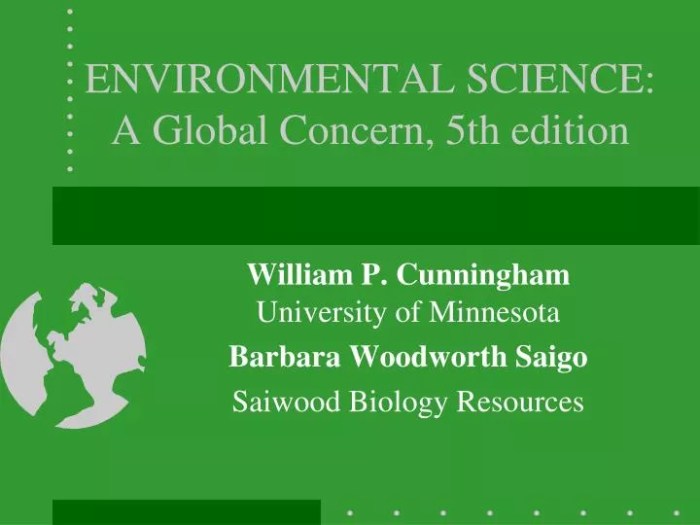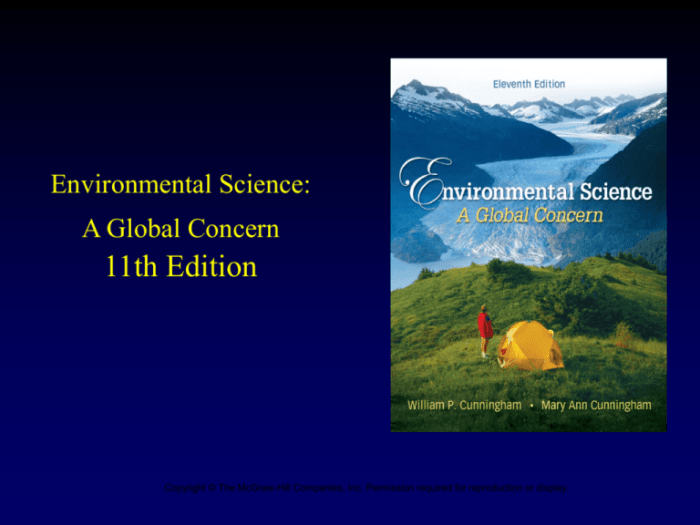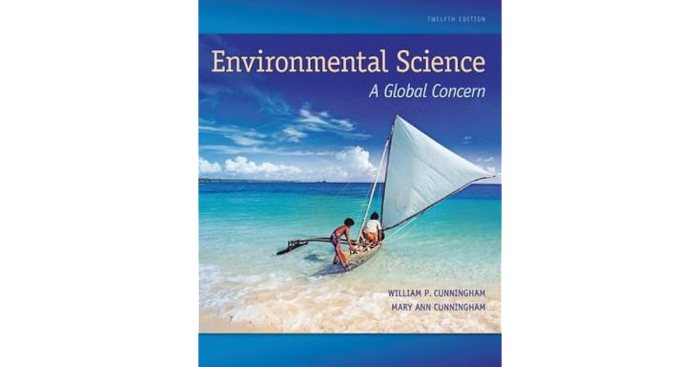Environmental science a global concern 15th edition pdf – Environmental Science: A Global Concern, 15th Edition PDF, offers a comprehensive examination of environmental issues, providing a profound understanding of the complex interactions between humans and the natural world.
This seminal work delves into the historical evolution of environmental science, exploring the Earth’s systems, human impacts on the environment, environmental policy and management, sustainable development, emerging environmental issues, and environmental ethics and values. Each chapter is meticulously crafted to provide a comprehensive overview of the subject matter, supported by real-world examples and case studies.
1. Introduction
Environmental science is the study of the environment, the interaction between humans and the environment, and the effects of human activities on the environment. It is a global concern because environmental problems, such as climate change, air pollution, and water pollution, affect all countries and all people.
The historical evolution of environmental science can be traced back to the early 19th century, when scientists began to study the effects of industrialization on the environment. In the mid-20th century, the environmental movement gained momentum, and environmental science became a recognized academic discipline.
The textbook “Environmental Science: A Global Concern, 15th Edition” is a comprehensive introduction to environmental science. It covers a wide range of topics, including the Earth’s systems, human impacts on the environment, environmental policy and management, sustainable development, and emerging environmental issues.
2. The Natural Environment

The Earth’s systems are the atmosphere, hydrosphere, geosphere, and biosphere. These systems interact with each other to create the conditions that support life on Earth.
Ecosystems are communities of living organisms and their physical environment. They are important for maintaining biodiversity, which is the variety of life on Earth.
Natural resources are materials and energy sources that occur naturally in the environment. They include air, water, soil, minerals, and fossil fuels. Sustainable management of natural resources is essential for ensuring that they are available for future generations.
Major Biomes
- Tropical rainforests
- Temperate deciduous forests
- Boreal forests
- Grasslands
- Deserts
3. Human Impacts on the Environment

Human activities have a significant impact on the environment. These activities include burning fossil fuels, deforestation, agriculture, and urbanization.
Air pollution is the release of harmful substances into the atmosphere. It can cause respiratory problems, heart disease, and cancer.
Water pollution is the contamination of water bodies with harmful substances. It can cause waterborne diseases, damage aquatic ecosystems, and make water unsafe for drinking.
Land degradation is the deterioration of land quality. It can be caused by erosion, salinization, and desertification.
Consequences of Deforestation
- Loss of biodiversity
- Soil erosion
- Climate change
- Water scarcity
4. Environmental Policy and Management

Government regulations and international agreements play a role in protecting the environment. These regulations and agreements set standards for air and water quality, limit the use of hazardous chemicals, and protect endangered species.
Environmental impact assessment is a process that evaluates the potential environmental impacts of a proposed project. It is used to ensure that projects are designed and implemented in a way that minimizes environmental damage.
Environmental management systems are frameworks that help organizations to manage their environmental impacts. They include policies, procedures, and practices that reduce pollution, conserve resources, and protect ecosystems.
Role of Public Participation
Public participation is essential for environmental decision-making. The public has a right to be informed about environmental issues and to have a say in decisions that affect the environment.
5. Sustainable Development
Sustainable development is development that meets the needs of the present without compromising the ability of future generations to meet their own needs.
The three pillars of sustainable development are economic development, social development, and environmental protection.
Achieving sustainable development is a challenge, but it is essential for the future of our planet.
Challenges of Sustainable Development, Environmental science a global concern 15th edition pdf
- Poverty
- Population growth
- Climate change
- Resource depletion
6. Emerging Environmental Issues
Emerging environmental issues include nanotechnology, biotechnology, and invasive species.
Nanotechnology is the study of materials and devices at the atomic and molecular scale. It has the potential to revolutionize many industries, but it also raises concerns about environmental and health risks.
Biotechnology is the use of living organisms or their products to make or modify products or processes. It has the potential to improve human health and agriculture, but it also raises concerns about environmental risks.
Invasive species are non-native species that have been introduced to an area and have become a threat to native species.
Risks of Nanotechnology
- Toxicity
- Environmental persistence
- Bioaccumulation
7. Environmental Ethics and Values
Environmental ethics is the study of the ethical dimensions of environmental issues.
There are different perspectives on the value of nature and the responsibilities of humans towards the environment.
Environmental ethics can help to shape environmental policy and decision-making.
Ethical Perspectives on Nature
- Anthropocentrism
- Biocentrism
- Ecocentrism
FAQ: Environmental Science A Global Concern 15th Edition Pdf
What is the significance of environmental science?
Environmental science plays a crucial role in understanding the complex interactions between humans and the natural world, enabling us to address environmental challenges and promote sustainability.
What are the major human impacts on the environment?
Human activities such as air pollution, water pollution, land degradation, and climate change have significant impacts on the environment, affecting ecosystems, biodiversity, and human health.
What is the concept of sustainable development?
Sustainable development aims to meet the needs of the present without compromising the ability of future generations to meet their own needs, balancing economic, social, and environmental considerations.